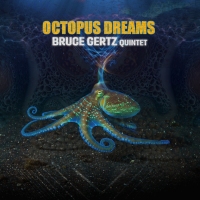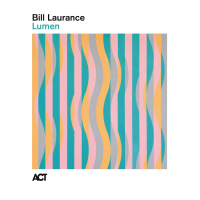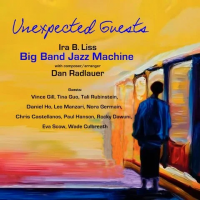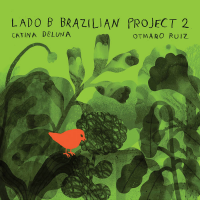Home » Jazz Articles » Multiple Reviews » Revolutionary Ensemble: Vietnam and Beyond the Boundary of Time
Revolutionary Ensemble: Vietnam and Beyond the Boundary of Time
The Revolutionary Ensemble was one of the most crucial outfits to form in the decade and one of the more instrumentally unique—a deft and egalitarian variant on the power trio: ex-AACM violinist

Leroy Jenkins
bass, electric1932 - 2007

Jerome Cooper
drumsb.1946

Sirone
bass, acoustic1940 - 2009
 Revolutionary Ensemble
Revolutionary Ensemble
Vietnam
ESP-Disk
2009
Vietnam, recorded at the Peace Church in Greenwich Village in 1972, marked the group's debut on wax over two lengthy pieces (The first 'version' of the title track across one and a half sides, the second a shorter and blistering Trane chase making up the rest). The introductory theme is a bluesy rondo, of the sort that one might expect from Dewey Redman or Ornette Coleman. Jenkins wavers between folksy lilt and classical poise, digging in double-stopped chords and choppy, flicked aerial maneuvers as Sirone's distorted bull fiddle swirls in massive, gooey amplified sonic sections. Occupying opposite ends of the spectrum, bass and violin are an overdriven, interlocking pair, resoundingly physical and strangely dexterous. Cooper accents the duo's feedback and bleeding calluses with airy cymbal work and press rolls.
At eight minutes in, Jenkins introduces a militaristic call, like something a fife player might play, to a regulated tom beat and droning bass. Slurred long tones then build into darts and leaps among scalar stairsteps, echoes of Ayler-esque martial themes and Coltrane-infused arpeggios in a maddening string conversation. Following a clear, motific percussion solo, the second half focuses on contrasts between thick, abrasive textures and 'little instruments' (bells, wooden flute, harmonica) with a bit of amplifier hum for good measure. While bugle calls and rattling temporarily fill the environment, one waits for an explosion around the corner. An auspicious debut, Vietnam is an extremely intense slab of music and unlike anything else in the ESP catalogue.
 Revolutionary Ensemble
Revolutionary Ensemble
Beyond the Boundary of Time
Mutable Music
2008
Beyond the Boundary of Time is the final recording to be released from the reformed Revolutionary Ensemble, following the 2004 Pi release And Now... Recorded live in Warsaw in 2005 (indeed, the best documents of the group's work have been live dates), the set features a composition by each of the three members and two group improvisations. Granted, much music happened for the members of the trio between their 1977 Enja swan song and the beginning of the new millennium. While Sirone composed for theater and Jenkins worked in his own numerous ensembles, Jerome Cooper's visibility stateside shrank, though he continued to work on his concept of multi-dimensional drumming, which includes reed instruments, balafon, keyboards (a Yamaha PSR 1500), gongs and the trap set.
Cooper's composition "Le-Si-Jer" exemplifies this approach, employing synthesizer as a tonal backing for mostly a capella violin and bass poems. The percussionist's own solo is a multi-layered tone-field employing bass drum, piano, chiramia and bala. In a sense, the music here is imbued with a degree of separateness not found in the Ensemble's early recordings and it's hard to expect a perfect meld after nearly a quarter-century of absence from the international creative music scene. But Cooper's piece allows the three to operate in separate, parallel spheres toward a convergence of grit and ether—a beautiful reprieve, indeed.
Tracks and Personnel
Vietnam
Tracks: Vietnam 1; Vietnam 2.
Personnel: Leroy Jenkins: violin, harmonica; Sirone: bass, wooden flute; Jerome Cooper: percussion, bugle.
Beyond the Boundary of Time
Tracks: Configuration; Usami; Le-Si-Jer; Improvisation I; Improvisation II.
Personnel: Leroy Jenkins: violin; Sirone: bass; Jerome Cooper: percussion, balafon, chiramia, Yamaha PSR-1500.
Tags
Comments
PREVIOUS / NEXT
Support All About Jazz
 All About Jazz has been a pillar of jazz since 1995, championing it as an art form and, more importantly, supporting the musicians who make it. Our enduring commitment has made "AAJ" one of the most culturally important websites of its kind, read by hundreds of thousands of fans, musicians and industry figures every month.
All About Jazz has been a pillar of jazz since 1995, championing it as an art form and, more importantly, supporting the musicians who make it. Our enduring commitment has made "AAJ" one of the most culturally important websites of its kind, read by hundreds of thousands of fans, musicians and industry figures every month.
Go Ad Free!
To maintain our platform while developing new means to foster jazz discovery and connectivity, we need your help. You can become a sustaining member for as little as $20 and in return, we'll immediately hide those pesky ads plus provide access to future articles for a full year. This winning combination vastly improves your AAJ experience and allow us to vigorously build on the pioneering work we first started in 1995. So enjoy an ad-free AAJ experience and help us remain a positive beacon for jazz by making a donation today.

New York City
Concert Guide | Venue Guide | Local Businesses
| More...



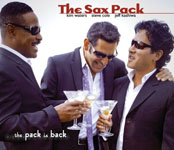


 Buy Now
Buy Now






